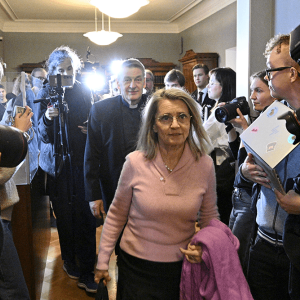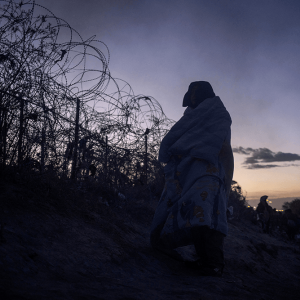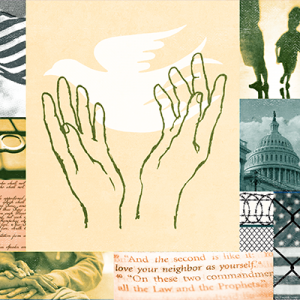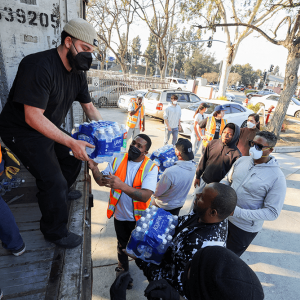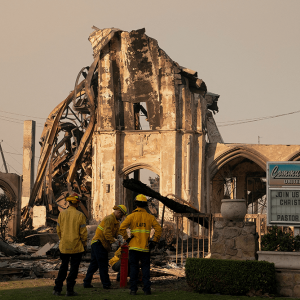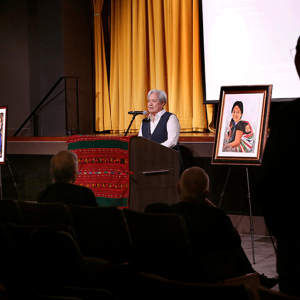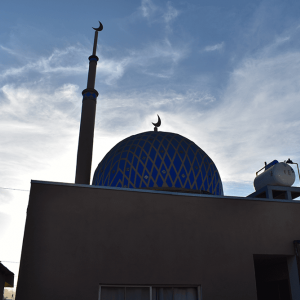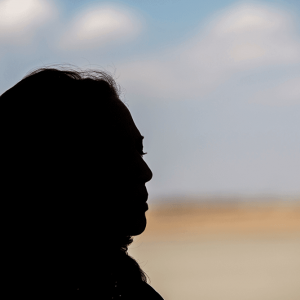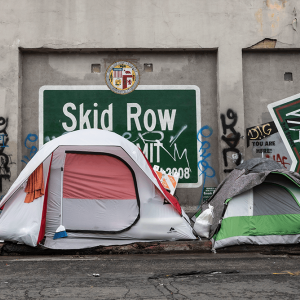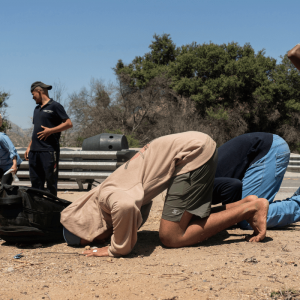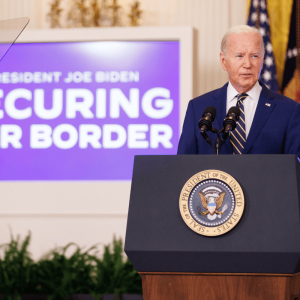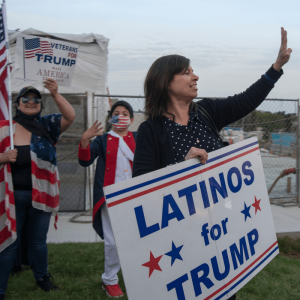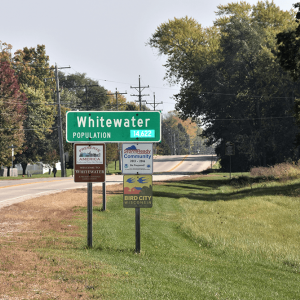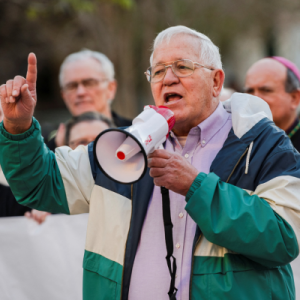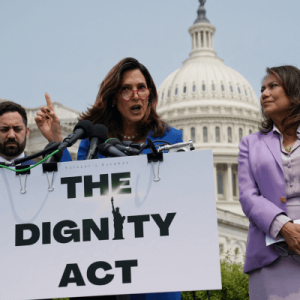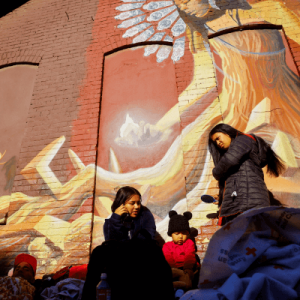
Ken Chitwood (@kchitwood) is a religion scholar and newswriter based between Germany and Arizona. He is a senior research fellow with the Muslim Philanthropy Initiative (IUPUI) and conducts research on Islam and Muslim communities in Latin America and the Caribbean, global religion, and ethnographic methods in an age of diversity and difference. Ken is editor of ReligionLink, a premier resource for journalists reporting on religion and serves as president of the Religion News Association (RNA). A Lutheran, Ken has been described as a “theologian without borders," interested in the contextualization of traditions across religious boundaries, physical borders, and cultural barriers.
Posts By This Author
DHS Bars Norma Pimentel’s Charity From Federal Funding

The Department of Homeland Security’s move to suspend funding for Catholic Charities of the Rio Grande Valley—and to seek an unusually long ban on future federal grants—is prompting concern among Catholic leaders and immigration advocates who see the action as part of a broader effort to curtail faith-based humanitarian work at the U.S.-Mexico border.
CCRGV, a South Texas nonprofit led by Sister Norma Pimentel, has been given 30 days to respond to DHS’s proposed debarment, which would shut the organization out of most federal funding streams for six years.
The suspension, which applies only to the South Texas organization, not to Catholic Charities USA or other diocesan agencies nationwide, would be a major blow to CCRGV. The charity, which operates the Humanitarian Respite Center in McAllen, Texas, has been a major recipient of DHS funds through the Federal Emergency Management Agency’s Emergency Food and Shelter-Humanitarian program and its newer Shelter Services Program.
Far-Right Christians Put Europe’s Online Speech Laws to the Test
On Thursday, Oct. 30, Finnish politician Päivi Räsänen had her day in court. Again.
Räsänen, a former interior minister, and Lutheran Bishop Juhana Pohjola, are being adjudicated for alleged hate speech after Räsänen tweeted a Bible verse questioning her church’s participation in a Pride event and co-authored a booklet with Pohjola outlining her beliefs on marriage and sexuality. Prosecutors claimed both constituted hate speech. Though Räsänen was twice acquitted in lower courts in Helsinki, the case will now be decided by the Finnish Supreme Court.
Beyond Finland, the case is just one moving part in an evolving, broadening battle over free speech that is escalating across the Atlantic.
Episcopal Diocese Defends Migrant Shelter, Citing ‘Jesus’ and ‘Constitution’
On March 11, the Department of Homeland Security sent the Episcopal Diocese of the Rio Grande a letter insinuating illegal activities at a diocesan shelter, including human trafficking.
‘We Are Full of Fear, but We Are Not Helpless’
Immigrant churches are standing in sacred resistance against Trump’s “shock and awe” immigration policies.
“WE ARE FULL of fear, but we are not helpless,” said Giselle, a 40-year-old living in a mixed-status immigrant family in Chicago. “We have the power of God, the power of the church, and the power of the Holy Spirit on our side,” she said. (Sojourners is withholding Giselle’s last name due to her sensitive immigration status.)
Giselle is the mother of two children who are U.S. citizens. She is long settled in Chicago, having arrived two decades ago from Michoacán, Mexico. She lives in a three-bedroom apartment in Chicago’s Little Village — known as the “Mexico of the Midwest” or “La Villita” by locals — and works as a bookkeeper and worships at a local Pentecostal church where, she told Sojourners, there are other immigrants without permanent legal status singing next to her on Sundays. She volunteers and donates to local charities and generally tries to be a good neighbor — offering her time, talent, and treasure to others in her little corner of Chicago. Giselle said she has built her life in the U.S. and that her adolescent children know nothing else. “We are proud to be Mexican American, to live life here and be part of this community,” she said.
Like thousands of others across the U.S., Giselle and her family do not know how the Trump administration’s stated mass deportation policies will play out. But as policies are put in place and enforcement efforts ramp up, questions keep running through Giselle’s mind: How will I protect my family? What will happen to my immigration status? How will I be able to seek safety in the U.S.? “These are just some of the questions that handicap my ability to live,” she said.
As the Trump administration continues to implement its mass deportation plans, a swirling vortex of pain, fear, and uncertainty dominates the conversation among immigrants and faith communities across the nation. People of faith are responding with hope, resilience, and a steady resolve to be the best neighbors they can be to immigrants in need.
What Faith Aid and Relief Groups Lose in Trump’s Funding Freeze
Pastor Ben Squires did not have “baseless allegations of money laundering by Lutheran social service agencies” on his 2025 bingo card.
And yet, in the early hours of Sunday morning, Feb. 2, Squires found himself reading a flurry of social media posts about Mike Flynn’s unfounded accusations and billionaire Elon Musk’s promise that the Department of Government Efficiency would be “rapidly shutting down” supposedly “illegal payments” to a list of Lutheran groups including Global Refuge (formerly Lutheran Immigration and Refugee Services), Pacific Lutheran University, and Lutheran Social Services organizations in Florida, Wisconsin, and South Dakota.
‘Chaos’ and ‘Confusion’ for Faith-Based Nonprofits After Funding Freezes
“It was chaos,” sighed Stacey Hall Burge, CEO of Found House Interfaith Housing Network, which provides emergency shelter and programs for families dealing with housing loss and insecurity in the Cincinnati area.
“From Monday to Friday, we had no specifics, no clarity,” said Burge, recounting the past week at her organization. “There are rents and supports for hundreds of families I am not sure how to pay right now. Families that worked hard to get off the streets, who may go right back. Many of them working, but unable to fully afford rent in the current housing crisis,” she told Sojourners in an interview over Zoom.
Fires Don’t Discriminate—Nor Should Recovery, Say LA Faith Leaders
As images from the cataclysmic firestorms engulfing Los Angeles County emerged, one word came up consistently in the captions: apocalyptic. The devastating effects of unusually wet winters followed by record-dry foliage and the incendiary whip of Santa Ana winds created the conditions for what Sammy Roth, the Los Angeles Times’ climate columnist, called “apocalyptic infernos.” But for faith and justice leaders in LA, the fires were apocalyptic in another way.
The Unofficial Saints of the U.S.-Mexico Border
Monuments that bear witness to the ubiquity of death — and faith — in America’s southwestern borderlands.
IT'S A GRAY, mid-May morning in Panteón Municipal #1, a city cemetery in Tijuana’s Zona Norte neighborhood. Alberto, the gatekeeper, saunters down a rocky pathway lined with palms, jacaranda, and gravestones to a prominent, red brick chapel, built over the tomb of one Juan Castillo Morales.
The shrine is covered wall-to-wall with candles, flowers, and plaques with names and messages of thanks to “Juan Soldado” (Juan the Soldier), as Castillo is known. Amid the array sits a stylized bust of a young soldier, resplendent in military attire, this morning bearing a black rosary and a blue-and-white Los Angeles Dodgers snapback hat.
The shrine is one of many unofficial memorials where loved ones remember lives of immigrants lost along the U.S.-Mexico border. From chapels erected around the graves of unofficial saints such as Castillo to digital memorials people carry with them into the desert to the crosses, flowers, and other mementos left along the border boundary itself, these monuments not only pay tribute to the individuals lost but bear witness to the ubiquity of death — and faith — in America’s southwestern borderlands.
Rosalba Ruiz-Hernández, a 46-year-old mother of five, stands in the shrine. Ruiz-Hernández, originally from the southern Mexican state of Oaxaca, was deported back to Tijuana after her own failed attempt to start a new life in the U.S. Two of her grown children still live in Long Beach, Calif., near her former husband. They are undocumented, she said, but they make a living. Two others are in Tijuana with her. Matías, her middle son, died in the desert on his way north to join his siblings in Southern California.
Politics Leans on Stereotypes. Art Shows ‘the Soul of Immigrants’
The amber appears to ooze across the floor like slow-flowing lava. Containing found objects and materials sourced from Salvadoran communities around Los Angeles, Eddie Rodolfo Aparicio’s artwork is expansive and expressive of the materiality of often-marginalized Central American migrants in Southern California.
At the Border, a Shelter By — And For — Muslim Women
Anyone crossing the U.S.-Mexico border faces a journey fraught with violence and danger. But for women and children, that journey is even more treacherous. Not only are many fleeing violence at home — including gender-based violence — they also experience higher rates of violence en route. Torture, mutilation, sexual violence, femicide,disappearances, and additional health complications are common occurrences for female migrants making their way north.
What Faith and Immigration Leaders Say About VP Harris’ Candidacy
When President Joe Biden announced he would not seek reelection and Harris became the presumptive nominee, leaders in faith and immigration said that Harris brings a new outlook to the future of their work.
As More Migrants End Up on Skid Row, a Catholic Order Seeks to Help
It’s an overcast Saturday morning on Gladys Avenue in Skid Row — a 54-block area in downtown Los Angeles, home to one of the country’s most stable populations of people experiencing homelessness or housing insecurity. Andrew Jiang of Alhambra, a city in western Los Angeles County, is there with a group of around 15 other volunteers with the Friars and Sisters Poor of Jesus Christ to serve chicken, rice, and vegetables to some 150 people living on Skid Row. On other days, a team of friars, nuns, and volunteers will walk block to block, distributing up to 400 sandwiches to more than 200 people.
Their Church Basement Used to Host Quinceañeras. Now It Houses Mauritanian Muslims
Dioulde and Jallo are two of 20 Mauritanians living in a space that used to be rented out for quinceañeras in the largely working-class area of southeast Los Angeles, where the population is 89.1 percent Latino. Now, in a space that families used to celebrate their daughters’ 15th birthdays under the sprinkling lights of a chandelier, there are rows of futon-style beds lined up against the walls, with folded Muslim prayer rugs, gallon-sized water bottles, and plastic sandals neatly stacked alongside.
‘Cruel and Racist.’ Faith Leaders Say Biden’s Border Shutdown Echoes Trump
Many faith leaders expressed deep disappointment at the announcement. While they agree something needs to be done about increased numbers at the border, they told Sojourners that Biden’s unilateral actions are the wrong approach. They also expect the executive order to be struck down in the courts.
Divided: Why Latino Christians Don’t Always Support Immigration Reform
Latinos do not always support candidates with progressive immigration policies — including policies that expand legal pathways to citizenship, enforce fewer penalties for those who immigrate without documentation, or end sanctions that devastate economies and fuel immigration. Experts and members of the community say Latinos of faith, with or without an immigration background, can feel torn between theologies that emphasize respect for the rule of law, a cultural emphasis on the family, allegiances to denominations that encourage support for conservative candidates, and their own personal trajectories.
Near the Border, Faith Groups Grapple With ‘Palpable Paranoia’ Over Immigration
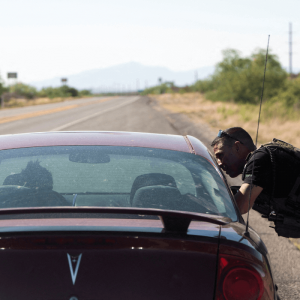
Cochise County Sheriff's Criminal Interdiction Team deputy Christopher Oletski speaks with a driver who exhibited what he felt were nervous driving behaviors, prompting him to initiate a traffic stop to clear the vehicle for undocumented persons before allowing the driver to proceed, near the U.S.-Mexico border in Tombstone, A.Z., on May 22. REUTERS/Rebecca Noble
“Immigration, whether you live in the south of the state or the far north, is a part of life here,” said Adam Burke, a Lutheran pastor in the Arizona city of Prescott, which is between Phoenix and the northern city of Flagstaff. “Whether you see it or not,” he said, “it impacts Arizonans every day.”
That is why in poll after poll in early 2024 — like those conducted by Noble Predictive Insights, Morning Consult, and the UK-based Redfield and Wilton Strategies — immigration is, along with reproductive rights and the economy, a top issue among Arizona voters.
How Immigration Became a Top Issue for Voters 1,500 Miles from the Mexico Border
Nestled in the heart of the flat, fertile lands of southeastern Wisconsin, Whitewater is a small city of around 15,000 with a college-town feel. When Samuel Schulz, a Wisconsin Synod Lutheran pastor, moved there after graduating from seminary last year, one of the first things he noticed was a large presence of Spanish speakers around town.
Despite Legal Threats, Texas Ministries Say ‘The Work of God Can Never Be Illegal’
Faith-based migrant ministries in Texas are used to operating in tough circumstances, including finding the right resources, meeting migrant needs, and funding their day-to-day work. But recent legal challenges have left some Texas faith leaders uncertain about the future of their ministries.
Evangelicals Want Immigration Reform. Here’s Why It's Unlikely They'll Get It
According to a recent Lifeway Research poll sponsored by the Evangelical Immigration Table and other evangelical groups, evangelicals desire immigration reform with increasing urgency. Showing a marked increase from prior years, 77 percent of poll respondents say it is important that Congress passes significant new immigration legislation in 2024 — up from 71 percent in 2022 and 68 percent in 2015.
Ahead of Election, Evangelicals Want Sermons on Immigration
Gabriel Salguero, president of the National Latino Evangelical Coalition, said the results show an increasing interest from everyday evangelicals — even urgency — to receive guidance on the issue from the pulpit. “More and more evangelicals are looking to scripture and what it has to say about the immigrant, the refugee, and the stranger,” he said. “Evangelicals want to move beyond just political talking points and be discipled on immigration reform.”
